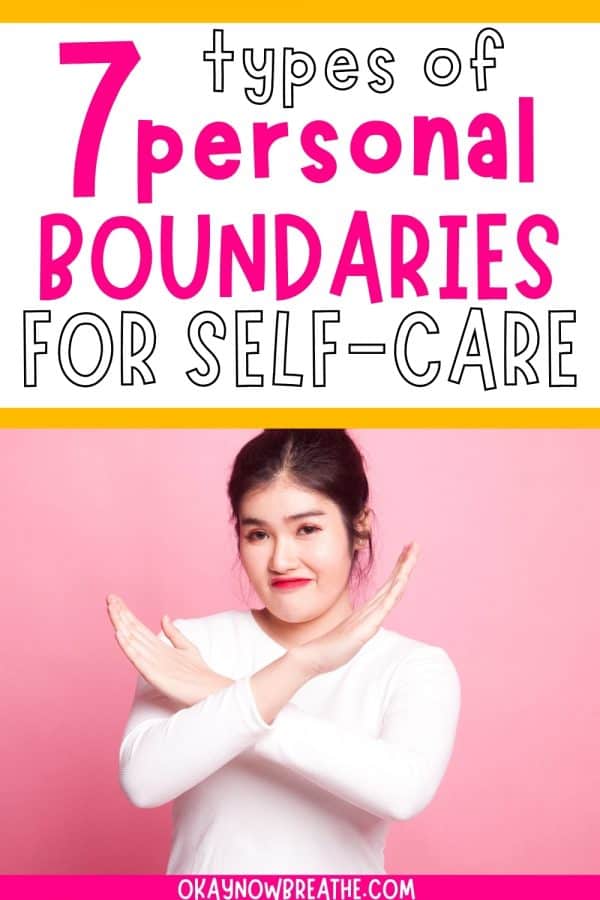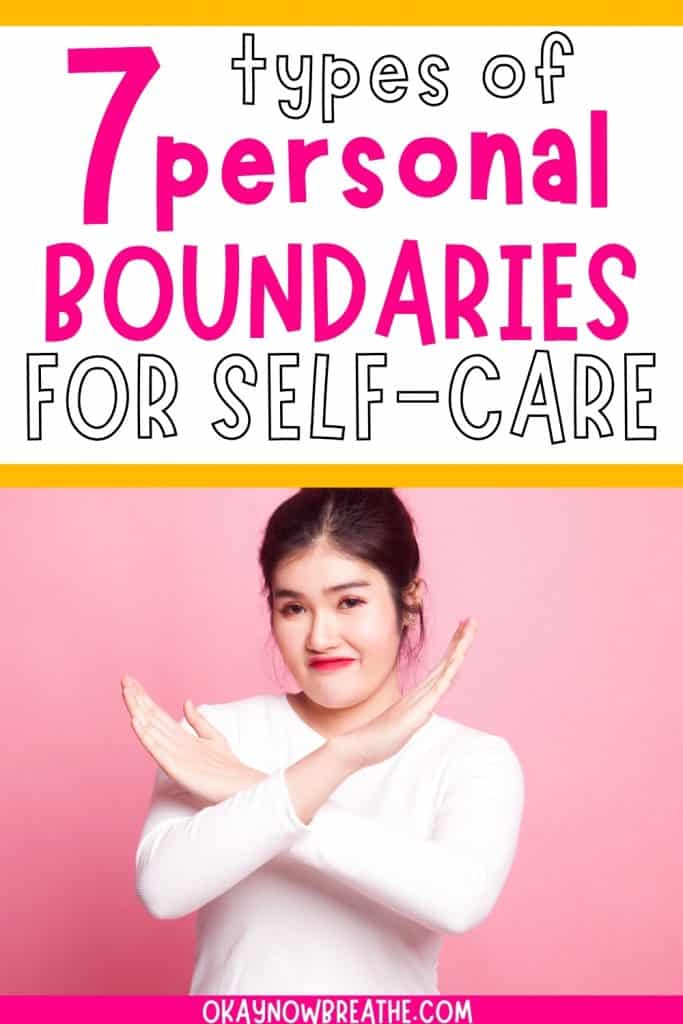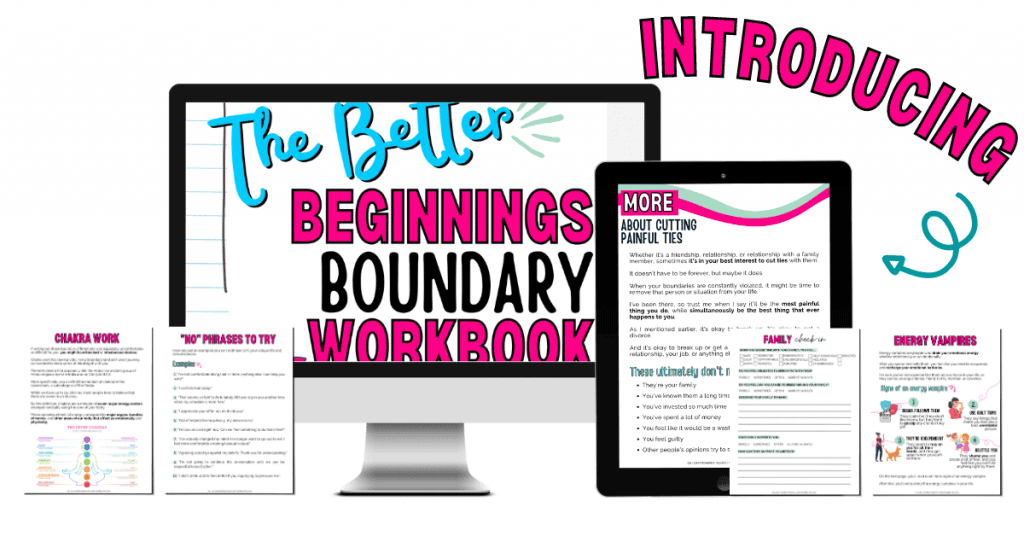
DISCLOSURE: I am not a mental health professional. If you need help finding a mental health care provider, call 1-800-662-HELP (4357) or visit Online Therapy to call, message, or video chat a certified therapist online. This post contains affiliate links. As an Amazon Associate, I earn from qualifying purchases. I may also receive compensation from Online Therapy or other sources if you purchase products or services through the links provided on this page. You can read my full disclaimer.
Self-Care Boundaries
Setting self-care boundaries and keeping them is one of the greatest acts of self-love you can ever give yourself.
What are your core values? What are your needs? What are things that people do that make you feel less than?
There are so many different types of personal boundaries that cover so many facets of life, and all of them are equally important.
The types of boundaries we’re going to be covering are physical, sexual, mental, emotional, material, time, and spiritual boundaries.
But first, let’s see why boundaries are essential to our emotional wellbeing 👇
Why are boundaries important in self-care?
Personal boundaries say that you matter.
Boundaries say that you care about yourself and that you’re finally going to start making your mental health a priority.
Boundaries say that you’re finally going to make yourself a priority.
Warnings of not enough boundaries:
💔 Feeling like you’re neglecting yourself and your needs
💔 Feeling burned out — stress, anxiety, brain fog, insomnia
💔 Feeling angry at yourself and the world
When you don’t have boundaries, it’s nearly impossible to have self-respect and self-love.
For more about self-care:
What are the benefits of setting boundaries?
The benefits of boundaries are endless, because it’s the ultimate form of self-care and self-love.
Signs of healthy boundaries:
💗 Saying no comes easily for you
💗 Improves communication skills
💗 Strengthens relationships
💗 Allows you to be vulnerable
Plus, boundaries don’t just benefit you!
Making personal boundaries are good for everyone!
Speaking of setting boundaries, have you downloaded your free inner child healing workbook yet? 👇

7 Types of Boundaries
All of these types of personal boundaries are non-negotiable.
So let’s dive deeper into them, shall we…
1. PHYSICAL BOUNDARIES
Physical boundaries protect your personal space and your body.
✔️ It is your right to decide if you want to be touched or not.
✔️ It is your right to prioritize getting enough rest, water, and delicious food into your system.
✔️ You deserve privacy and a right to confidentiality.
Example of Physical Boundary:
Let me guess…Do you ever get uncomfortable if someone stands too close to you?
That means your physical boundary is being violated.
It is your right to move away from them or to tell them to give you more space.
That is you protecting your physical boundary.
Learn how to set boundaries with toxic parents:
👉 How to Set Boundaries with Toxic Family Members (& Gain Back Your Sanity)
2. SEXUAL BOUNDARIES
Sexual boundaries protect your comfort level with sexual touch and activity.
✔️ You have a right to consent (which should be a no brainer).
✔️ You have a right to define what you like and don’t like sexually.
✔️ You deserve to have the truth about your partner’s sexual history and if they’ve had STDs.
✔️ You get to decide what kinds of sexual touch and intimacy you want and with who, when, where, and how often.
Example of Sexual Boundary:
A common example of this boundary would be say you’re not comfortable with having sex on the first date.
So you decide to enforce your boundary by ending the incredible first date with a kiss instead, because that’s where you were comfortable with.
(Plus, that would be sexual assault if it ended differently.)
That’s an empowering act of self-love.
3. MENTAL BOUNDARIES
Mental boundaries protect your thoughts, values, and opinions.
✔️ They help you differentiate your feelings from other people’s feelings.
✔️ It is your right to not always be responsible for how other people feel.
✔️ Seeing eye-to-eye with another person is not always possible.
✔️ It is your right to walk away from things that drain your energy.
Example of Mental Boundary:
An example would be having a parent who is typically argumentative and turns the majority of your conversations into a debate.
To set a boundary you would tell them, “If today turns into an argument, I will cut our visit short.”
Enforcing it would be leaving their home if a conversation turns heated.
That’s you prioritizing your mental wellbeing.
4. EMOTIONAL BOUNDARIES
Emotional boundaries protect you by allowing you to have a whole range of human thoughts and emotions.
✔️ It is your right to not have your feelings be criticized.
✔️ It is your right to not be invalidated.
✔️ It is your right to walk away from people who are no good for you.
Example of Emotional Boundary:
One example of an emotional boundary would be telling your spouse to not talk down to you, especially in front of your kids.
It belittles you and makes you feel small and incompetent, and it doesn’t set a good example.
If this boundary continues to be violated, you have every right to end the relationship or marriage.
That is a forceful act of self-love.
5. MATERIAL BOUNDARIES
Material boundaries protect access to your money, your car, your home, your clothes, your books, and any other possessions.
✔️ It is your right how you chose to spend your money.
✔️ You get to decide how your personal possessions are treated.
✔️ It is your decision who you are comfortable sharing them with, or if you don’t want to share them at all.
Example of Material Boundary:
An example of this would be deciding to say no to your brother when he wants to borrow money from you.
He has a track record of not paying you back, so saying no to him allows you to respect your boundaries.
6. TIME BOUNDARIES
Time boundaries protect how you spend your days.
✔️ You get to decide how you spend your time.
✔️ You get to decide to not have people waste your time, to not do activities you don’t want to do, and to not be overworked.
Example of Time Boundary:
One example of a time boundary would be to leave your phone on silent and away when you spend precious time with your family in the evenings.
Your work emails can wait until the next morning.
This boundary tells you, your family, and your work that family time is an important, non-negotiable boundary for you.
7. SPIRITUAL BOUNDARIES
Spiritual boundaries protect your right to believe in what you do or do not believe in.
✔️ You get to worship how you’d like and practice whatever beliefs feel right for you.
✔️ This includes nothing at all.
Example of Spiritual Boundary:
An example of a spiritual boundary would be believing in God but not going to church or following a specific religion.
Your boundary allows you to be completely comfortable on your spiritual journey.
More on spirituality:
Are setting self-care boundaries good for you?
As I’ve said before, setting boundaries and actually enforcing them will set your heart and soul into alignment.
By practicing boundaries, you’ll have more self-respect and more self-love.
The more you enforce boundaries, the less guilty you’ll feel.
This means you’ll have more time and energy to live your beautifully authentic life.
How do boundaries strengthen your sense of self?
The reality is you can’t change how other people treat you, or how they act, or how they feel.
Because of this, setting boundaries (and actually enforcing them!) helps strengthen your sense of self.
When you don’t have boundaries, it’s incredibly difficult distinguishing your wants and needs from those of others.
With boundaries, your thoughts, feelings, wants, and needs rightfully become your own.
Plus, walking away from situations that are constantly hurting you is a forceful act of self-love.
It’s intentional.
And it’s vital.
Setting personal self-care boundaries:
So now, I want you to define your personal boundaries — physical, sexual, mental, emotional, material, time, and spiritual.
How will you establish, protect, and enforce your boundaries?
You can answer these questions (and much, much more!) in My Self-Love Journal.
I know this is hard, but I believe in you!
Related self-care posts:
- 5 Self-Love Languages (to Spark Self-Care Into Your Life)
- 17 Self-Care Subscription Boxes for Women (Who Seriously Need to Chill)
- 17 Best, Must-Have Self-Care Products for 2021
Did you know there’s online therapy?
Online Therapy is a complete online therapy toolbox.
Your therapy toolbox includes:
-
- Live video, voice, or text chat session with your therapist
- 8 easy-to-follow sections, including 25 worksheets
- Activity plan, journal, and tests
- Yoga and meditation videos
What I love about Online Therapy is that there are several life-changing options and therapists available, and you don’t even have to leave the comfort of your home.
This means you never need to worry before getting help.
Get 20% off your first month with my exclusive link.




